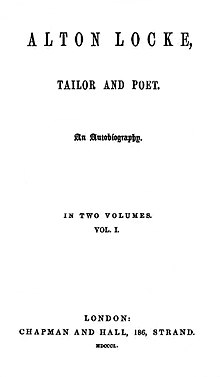 First edition title page First edition title page | |
| Author | Charles Kingsley |
|---|---|
| Publication date | 1850 |
| This article needs additional citations for verification. Please help improve this article by adding citations to reliable sources. Unsourced material may be challenged and removed. Find sources: "Alton Locke" – news · newspapers · books · scholar · JSTOR (December 2009) (Learn how and when to remove this message) |
Alton Locke is an 1850 novel, by Charles Kingsley, written in sympathy with the Chartist movement, in which Carlyle is introduced as one of the personages.
Overview
In this novel, Kingsley set out to expose the social injustice suffered by workers in the clothing trade and the trials and tribulations of agricultural labourers. It also gives an insight into the Chartist campaign with which Kingsley was involved in the 1840s.
Plot
Alton Locke is the story of a young tailor-boy who has instincts and aspirations beyond the normal expectations of his working-class background. He is intensely patriotic and has ambitions to be a poet. In the course of the narrative, Alton Locke loves and struggles in vain.
Physically, he is a weak man, but is able to encompass all the best emotions, along with vain longings, wild hopes, and a righteous indignation at the plight of his contemporaries. He joins the Chartist movement because he can find no better vehicle by which to improve the lot of the working class, experiencing a sense of devastation at its apparent failure. Utterly broken in spirit, Alton Locke sails for America to seek a new life there; however, he barely reaches the shore of the New World before he dies.
References
- Kingsley, Charles (1856). "Alton Locke". Google Books. Retrieved 12 October 2022.
External links
- https://www.gutenberg.org/cache/epub/8374/pg8374.html - The novel on Project Gutenberg. Be noted it has a really long preface, which deals with its author.
| Novels by Charles Kingsley | |
|---|---|
|
This article about an 1850s novel is a stub. You can help Misplaced Pages by expanding it. See guidelines for writing about novels. Further suggestions might be found on the article's talk page. |